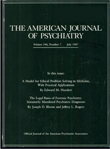Association of Elevated α1-Antichymotrypsin With Cognitive Impairment in a Prospective Study of the Very Old
Abstract
OBJECTIVE: The authors investigated the relationships between concentrations of two acute-phase proteins, α1-antichymotrypsin (ACT) and α2-macroglobulin (MAC), and cognitive impairment in the very old. METHOD: Concentrations of ACT and MAC were determined in a prospective study using sera from medically stable elderly nursing home residents. Cognitive impairment was assessed with the Mini-Mental State. RESULTS: Concentrations of ACT were associated with greater cognitive impairment, as reflected by lower Mini-Mental State scores. This relationship did not exist for MAC. CONCLUSIONS: These data extend previous reports that patients with Alzheimer's disease have greater concentrations of ACT in their blood by demonstrating in a diagnostically diverse nursing home population a relationship between serum ACT and mental status. Elevated serum ACT in patients with compromised mental status may reflect a cerebral acute-phase response.



